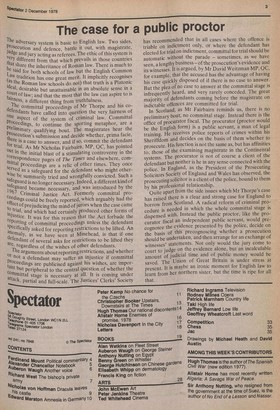The case for a public proctor
The adversary system is basic to English law. Two sides, prosecution and defence, battle it out, with magistrate, JUdge and jury acting as referees. The ethic of this system is ,v,erY different from that which prevails in those countries at share the inheritance of Roman law. There is much to .ne said for both schools of law but the English Common l-aw tradition has one great merit. It implicitly recognises (as the Roman law schools do not) that truth is a Platonic Ideal, desirable but unattainable in an absolute sense in a ce°. i 11 11 of law; and that the most that the law can aspire to s tairness, a different thing from truthfulness. The committal proceedings of Mr Thorpe and his co"etendants have called into question the very fairness of one aspect of the system of criminal law. Committal Proceedings , to continue the sporting metaphor, are a Preluninary _ qualifying bout. The magistrates hear the PtLrosecution's sub-mission and decide whether, prima facie, tuere.is a case to answer, and if so, commit the defendant oior trial. As Mr Nicholas Fairbairn, MP, QC, has pointed _ lit in the initial blast of a stimulating controversy in the correspondence pages of The Times and elsewhere, committal proceedings are a relic of other times. They once _e.rved as a safeguard for the defendant who might other_wtse be summarily tried and wrongfully convicted. Such a s_afeguard is no longer necessary. Indeed, a different kind of aeguard became necessary, and was introduced by the 67 Criminal Justice Act. Formerly committal pro!edings could be freely reported, which arguably had the etfec.t of prejudicing the mind of jurors when the case came and which had certainly produced other forms of irnlustice. It was for this reason that the Act forbade the e ..N,rtIng of committal proceedings unless the defendant 4Peeifically asked for reporting restrictions to be lifted. An an, omaly, as we have seen at Minehead, is that if one _uefendant of several asks for restrictions to be lifted they 're, regardless of the wishes of other defendants.
_ The arguments about reporting restrictions, and whether
°r not a defendant may suffer an injustice if committal Proceedings are publicised against his wishes, are important but peripheral to the central question of whether the c11rnittal stage is necessary at all. It is coming under at ack, partial and full-scale. The Justices' Clerks' Society has recommended that in all cases where the offence is triable on indictment only, or where the defendant has elected for trial on indictment, committal for trial should be automatic without the parade — sometimes, as we have seen, a lengthy business—of the prosecution's evidence and its witnesses. It is argued, by Mr David Weitzman MP, QC, for example, that the accused has the advantage of having his case quickly disposed of if there is no case to answer. But the plea of no case to answer at the committal stage is infrequently heard, and very rarely conceded. The great majority of defendants coming before the magistrate on indictable offences are committed for trial.
In Scotland, as Mr Fairbairn reminds us, there is no preliminary bout, no committal stage. Instead there is the office of procurator fiscal. The procurator (proctor would be the English form) is a public servant, a man of legal training. He receives police reports of crimes within his Sheriffdom and decides on the basis of them whether to prosecute. His function is not the same as, but has affinities to, those of the examining magistrate in the Continental systems. The procurator is not of course a client of the defendant but neither is he in any sense connected with the police. In England, as the President of the Prosecuting Solicitors Society of England and Wales has observed, the prosecuting solicitor is a client of the police, bound to them by his professional relationship. Quite apart from the side issues which Mr Thorpe's case has raised there is a clear and strong case for England to borrow from Scotland. A radical reform of criminal procedure is needed in which the whole committal stage is dispensed with. Instead the public proctor, like the procurator fiscal an independent public servant, would precognosce the evidence presented by the police, decide on the basis of this precognoscing whether a prosecution should be undertaken, and then arrange for an exchange of witnesses' statements. Not only would the jury come to court to judge on the evidence alone, but an incalculable amount of judicial time and of public money would be saved. The Union of Great Britain is under stress at present. It is maybe an ironic moment for English law to learn from her northern sister, but the time is ripe for all
that.






































 Previous page
Previous page